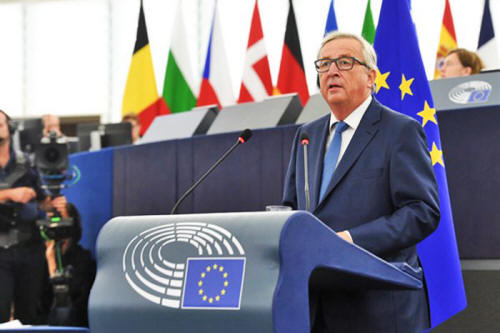|
from WorldPoliticsReview Website
delivers his 2016 State of the Union Address, Strasbourg, France, Sept. 14, 2016
(EU Commission
photo).
Between the ongoing migrant crisis, the continued rise of populism, a series of terrorist attacks and Brexit, there are many reasons to conclude that the EU is in dire straits.
With the bloc facing high unemployment, social inequality, public debt and security concerns, he said the next 12 months would be decisive in efforts,
To bridge these divisions and move the union forward, Juncker laid out a series of policy proposals that include,
On the security front, Juncker outlined plans for,
The response to the speech was mixed.
Politico EU called Juncker's performance "very controlled," especially compared to the "car crash" that was last year's speech, which drew attention for its stark, blunt tone.
The Financial Times praised him for trying to,
The New York Times, however, was more critical in an editorial.
Two days after Juncker's speech, EU leaders, with the exception of British Prime Minister Theresa May, met in Bratislava, Slovakia, for an informal summit.
Prior to the gathering, European Council President Donald Tusk circulated a letter outlining the challenges facing the EU:
While acknowledging the frustration with the current state of affairs felt by many national electorates - and governments - across the EU, Tusk's letter also claimed that,
German Chancellor Angela Merkel agreed with that sentiment.
It is going to takemore than vague policy statementsor free Wi-Fito fix what is broken in the EU.
The assembled leaders were able to present a somewhat united front at the summit, agreeing to a policy "roadmap" for the next six months that focuses on improving European security and boosting the economy.
Concrete policy proposals are
supposed to be presented at a summit scheduled for March 2017 to
celebrate the 60th anniversary of the EU's founding treaty.
At a joint press conference with French President Francois Hollande, Merkel offered her own optimism:
But this picture of unity was short-lived. In a separate press conference, Italian Prime Minister Mario Renzi told reporters,
Renzi voiced frustration that some of the biggest issues facing the EU, namely the migration crisis, weren't properly discussed.
Hungarian Prime Minister Viktor Orban also criticized the summit, which he said failed to alter the EU's,
Orban has long been critical of Brussels, and one senior EU official was quoted by Reuters as saying Orban's complaints were,
Yet domestic politics are a major concern across the union.
Far-right and anti-EU parties are leading in the polls ahead of elections next year in France and the Netherlands, and a candidate from the far-right Freedom Party is in a run-off vote for Austria's presidency.
In Germany, which has been
steadfast in its support of the EU, the anti-immigrant Alternative
for Germany party is growing in popularity. Its rise, combined with
back-to-back disappointments for Merkel's conservative Christian
Democratic Union in regional elections, has many in her party
worried ahead of next year's federal elections.
So is the fact that European leaders like Merkel are actively trying to build unity within the bloc. But it is going to take more than vague policy statements or free Wi-Fi to fix what is broken in the EU.
In the next six months, its member states must turn the broad objectives of the Bratislava summit into real policies if they are to restore people's faith in the European project.
Given the severity of the
challenges facing the EU, though, most people in Brussels and across
Europe are not very optimistic on that front.
|


